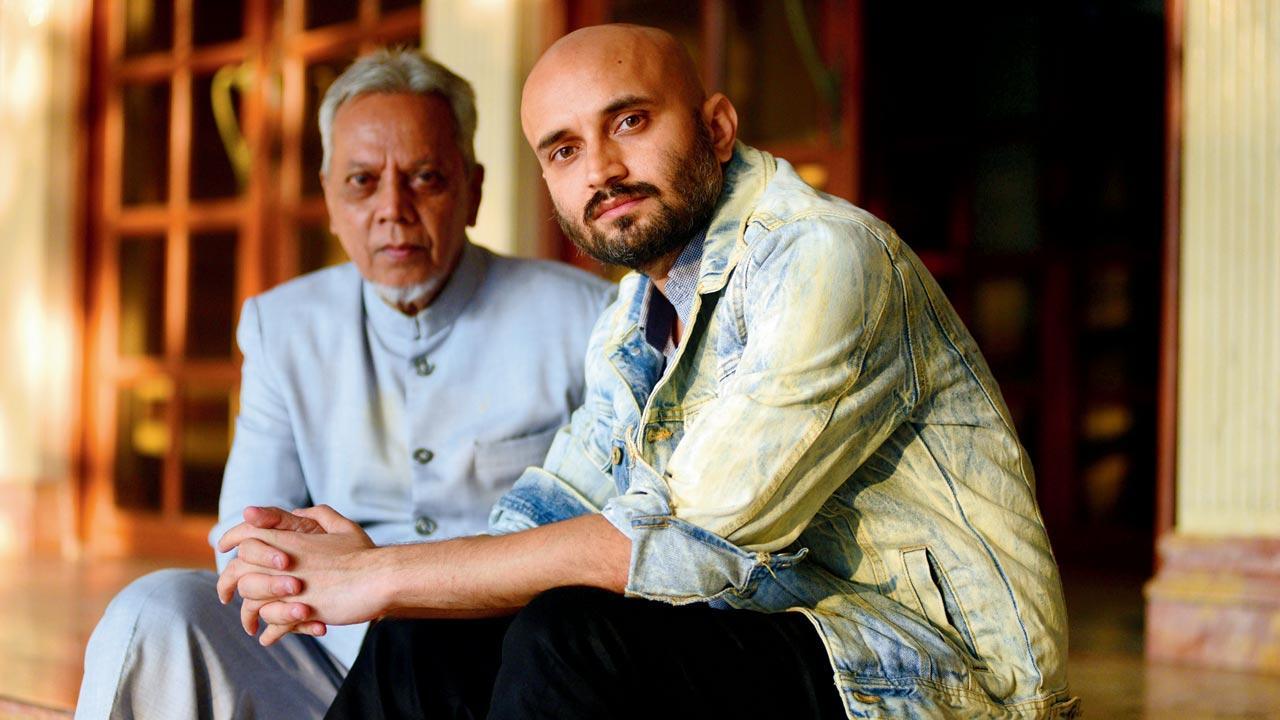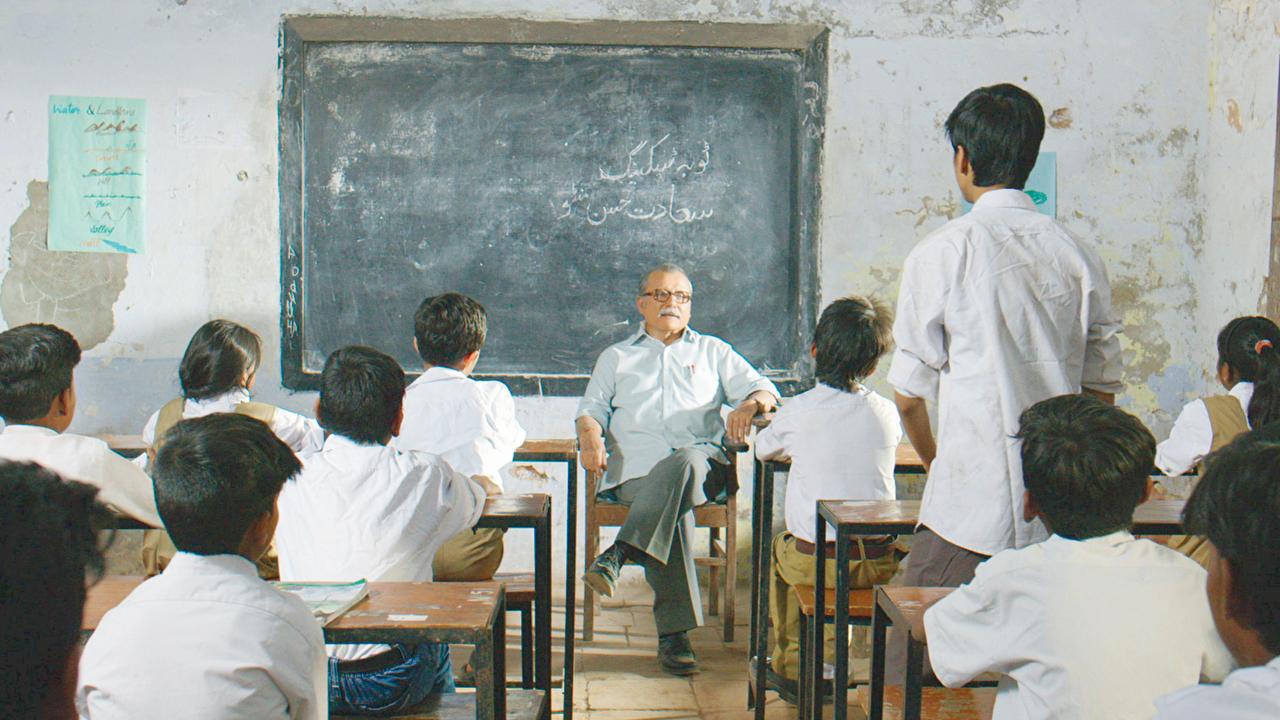A young Mumbai filmmaker’s wish to see Urdu thrive brings him together with a former professor and poet of the language to celebrate a tongue that was once the toast of Bollywood

Filmmaker Munzir Naqvi with Jameel Kamil, poet and former Urdu professor at Maharashtra College, Nagpada. Naqvi feels digitisation of Urdu literature will help make the language more accessible to a younger audience. Pic/Ashish Rane
What happens when you bring two Urdu lovers together for an interview? It turns into a quasi mushaira.
Filmmaker Munzir Naqvi, 35, who has written the film Sehar, and Jameel Kamil, poet and former Urdu professor at Maharashtra College came together to discuss their love for the language, and its complicated status while drawing on their own experiences. Sehar, which releases next year, follows the travails of Mahendra Nath Kaul (Pankaj Kapur), an Urdu professor at a college in Lucknow, who, faced with diminishing enrolment and poor funding, is struggling to save his course from closure. The 97-minute feature film has been shot at Lucknow Christian College, Centennial College, Girdhari Singh Inter College and Old City locality. Kamil, who retired from Maharashtra College in 2013, has witnessed the academic trajectory of the language first hand.
Edited excerpts from the interview.
What inspired you to write Sehar? A script that was penned a decade ago, but is now seeing the light of day.
Munzir Naqvi: I was born in a family of poets and writers, and grew up in Lucknow’s Kashmiri Mohalla, called thus because of the Kashmiri Pandits who settled there decades ago. It was also a locality that was home to renowned Urdu writers, and not necessarily Muslim, as it is often erroneously assumed. In fact, Krishna Bihari ‘Noor’, whose noted works include Dukh-Sukh and Tapasya, was one of the last of the great poets that Lucknow produced. I had watched him perform when I was 10; that stayed with me. What propelled me to write this script was the fact that Urdu began getting stereotyped, and entwined with religion. Native speakers of the language in Lucknow began shying away from claiming it as their mother tongue. Where was this sense of shame stemming from? While I understand that films can’t bring about a revolution, mine is an attempt to at least start a discourse.
 Sehar features Pankaj Kapur in the role of Mahendra Nath Kaul, an Urdu professor at a college in Lucknow trying to save the course from closing
Sehar features Pankaj Kapur in the role of Mahendra Nath Kaul, an Urdu professor at a college in Lucknow trying to save the course from closing
In 2015, I met Pankaj Kapur through cinematographer Dharam Gulati. Pankaj Kapur saab was my first choice for the film—he also happens to speak Urdu well. His diction and command is immaculate.
Jameel Kamil: I believe it’s a good time for a young filmmaker to focus on a language that has been maligned and is seeing a decline. Urdu is a beautiful amalgamation of Sanskrit, Arabic and Persian. In the late 1800s, administrative, judicial and all other official work in the country was conducted in Urdu. It was at the time considered the propriety of the educated elite. It was progressive and mainstream. For every Mirza Ghalib, Ismat Chughtai, Sadaat Hasan Manto and Faiz Ahmad Faiz, there was a Brij Narain ‘’Chakbast’’, Ratan Nath ‘’Sarshar’’, Raghupati Sahai ‘’Firaq’’, Anand Narain ‘’Mulla’’, Rajinder Singh Bedi, Gopi Chand Narang. These and hundreds of other non-Muslim poets and writers contributed to the language. It’s sad that we associate Urdu with a religion when the fact is that we all speak a little Hindi and a little Urdu in India today. Did you know that Manmohan Singh cannot read Hindi? All his speeches were written in Urdu.
Tell us about Bombay’s Urdu connection.
JK: Back in the 1950 right up till the ’80s, Urdu was taught in mainstream educational institutions including the prestigious Elphinstone College, Ruparel, and St Xavier’s College. Churchgate’s KC College, in fact, offered Urdu, Sindhi, English and French. And there was of course, Ismail Yusuf College and Anjuman-I-Islam, which continue to offer the course. When I took up Urdu as the subject for BA major, the classes were held at the University of Mumbai, Fort, campus. At the time, we had an impressive cosmopolitan batch. Those who wanted to become lecturers, ghazal singers, scriptwriters and lyricists in Bollywood, or wanted to take up Unani medicine—an alternative healing system that draws on the ancient traditional systems of medicine of China, Egypt, India, Iraq, Iran and Syria—all signed up.
Later, in 1968, when I took up the position of Urdu professor at Maharashtra College, we had at least 50 students majoring in Urdu every year. A lot of the students joined us because the late ’80s onwards, other mainstream colleges began discontinuing the course, due to the dearth of Urdu lecturers, greater demand for other languages and lower enrolment. It still makes me sad.
MN: When I moved to Mumbai in 2005, I was amazed to see the number of government-run Urdu schools. Surprisingly, Lucknow doesn’t have any [municipal Urdu school]. The language is seeing a decline in the state because it is not being promoted. The politicisation started with the British. The language of resistance during the Revolt of 1857 was still Urdu. After it was quelled, the British started viewing the educated Muslims who they employed in government services as having betrayed them. To balance the scales, the colonial rulers started favouring Hindi writers, and the Devanagri script.
What has been the impact of Urdu on films?
MN: In popular culture, Urdu has come to be associated with the skull cap, beard and sherwani. This is subliminal messaging that influences our perception. In my film, I was careful about staying away from stereotypes to portray a character. So, you’ll see Pankaj Kapur clean shaven and dressed in shirt and trousers.
JK: Earlier, dialogues as well as the songs in Hindi films were written in Urdu. It was a sure shot way of ensuring that your songs did well. Filmmakers used to put immense emphasis on the pronunciation of Urdu phonetics back then. They were careful about sounds like ‘kh’ as in kharaaab, ‘gh’ as in ghalat. Recently, Mahendra Kapoor’s son Rohan had asked me to guide his son Sidhant with Urdu pronunciation and phonetics as he plans to release a single in Urdu.
How do we reverse the damage?
MN: In recent times it’s undoubtedly businessman and cultural entrepreneur Sanjiv Saraf, who has played a key role. He founded Rekhta in 2013, the world’s largest repository of Urdu books digitised to be accessed by students, book lovers and educationists. Delhi-based Saraf belongs to the Shekhawati region of Rajasthan. Urdu is not his mother tongue. But in his interviews, he has said that his father was a keen follower of Urdu ghazals and shayri. Listening to Mehdi Hasan, Begum Akhtar, Iqbal Bano and Farida Khanum on the radio and vinyl was an important part of his childhood.
JK: While mushairas continue to be held in small pockets, the quality of content is not the same. We need to encourage and patronise more Urdu bookstores like Maktaba Jamia near JJ Junction, Bhendi Bazar, which is the only literary mecca for Urdu readers. It has attracted poets and writers from around the world. We need more.
 Subscribe today by clicking the link and stay updated with the latest news!" Click here!
Subscribe today by clicking the link and stay updated with the latest news!" Click here!










